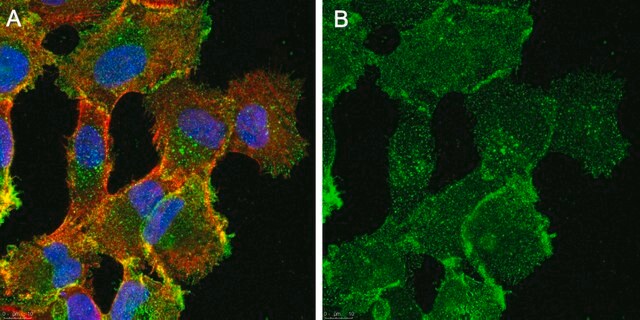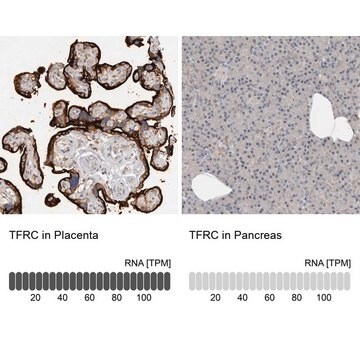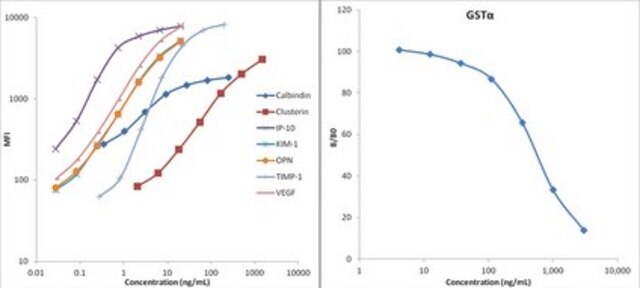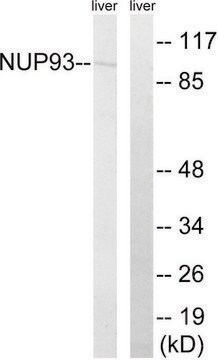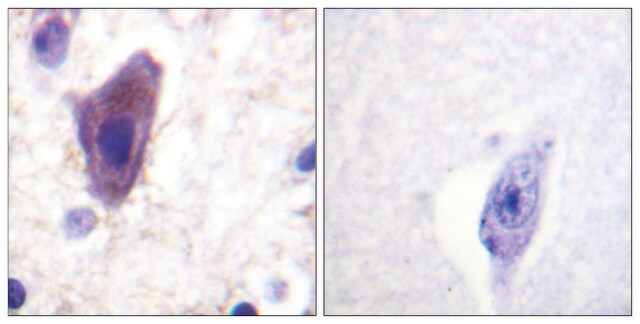SAB4700519
Monoclonal Anti-CD71-PE antibody produced in mouse
clone MEM-75, purified immunoglobulin, buffered aqueous solution
Sinonimo/i:
Anti-TFRC, Anti-Transferrin Receptor
Autenticatiper visualizzare i prezzi riservati alla tua organizzazione & contrattuali
About This Item
Codice UNSPSC:
12352203
NACRES:
NA.41
Prodotti consigliati
Origine biologica
mouse
Coniugato
phycoerythrin (R-PE) conjugate
Forma dell’anticorpo
purified immunoglobulin
Tipo di anticorpo
primary antibodies
Clone
MEM-75, monoclonal
Stato
buffered aqueous solution
Reattività contro le specie
human
tecniche
flow cytometry: suitable
Isotipo
IgG1
N° accesso NCBI
N° accesso UniProt
Condizioni di spedizione
wet ice
Temperatura di conservazione
2-8°C
modifica post-traduzionali bersaglio
unmodified
Informazioni sul gene
human ... TFRC(7037)
Descrizione generale
Cluster of differentiation 71 (CD71), also known as transferrin receptor, is encoded by the gene mapped to human chromosome 3q29. CD71 is present on cells with high proliferation.
The antibody MEM-75 reacts with CD71 antigen (transferrin receptor), a 95 kDa type II homodimeric transmembrane glycoprotein expressed on activated B and T lymphocytes, macrophages and erythroid precursors; it is lost on resting blood leukocytes.
Immunogeno
NALM-6 human pre-B cell line
Applicazioni
Monoclonal Anti-CD71-PE antibody produced in mouse has been used to estimate the cell surface transferrin receptor (TfR) levels.
The reagent is designed for Flow Cytometry analysis of human blood cells using 20 μL reagent / 100 μL of whole blood or 1e6 cells in a suspension. The content of a vial (2 mL) is sufficient for 100 tests.
Azioni biochim/fisiol
Cluster of differentiation 71 (CD71) functions as an iron regulatory protein. Overexpression of the gene has been associated with the development of various types of cancers, including cholangiocarcinoma (CCA). Thus, CD71 protein is considered as a potential therapeutic target for CCA and iron overload. The encoded protein facilitates mitochondrial respiration and reactive oxygen species (ROS) production in human pancreatic ductal adenocarcinoma (PDAC) cells, which is essential for their tumorigenic growth. Thus, aberrant expression of CD71 might also lead to the development of pancreatic cancer.
Caratteristiche e vantaggi
Evaluate our antibodies with complete peace of mind. If the antibody does not perform in your application, we will issue a full credit or replacement antibody. Learn more.
Stato fisico
Solution in phosphate buffered saline containing 15 mM sodium azide and 0.2% high-grade protease free BSA as a stabilizing agent.
Esclusione di responsabilità
Unless otherwise stated in our catalog or other company documentation accompanying the product(s), our products are intended for research use only and are not to be used for any other purpose, which includes but is not limited to, unauthorized commercial uses, in vitro diagnostic uses, ex vivo or in vivo therapeutic uses or any type of consumption or application to humans or animals.
Non trovi il prodotto giusto?
Prova il nostro Motore di ricerca dei prodotti.
Codice della classe di stoccaggio
10 - Combustible liquids
Classe di pericolosità dell'acqua (WGK)
WGK 2
Punto d’infiammabilità (°F)
Not applicable
Punto d’infiammabilità (°C)
Not applicable
Scegli una delle versioni più recenti:
Possiedi già questo prodotto?
I documenti relativi ai prodotti acquistati recentemente sono disponibili nell’Archivio dei documenti.
Intracellular labile iron determines H2O2-induced apoptotic signaling via sustained activation of ASK1/JNK-p38 axis
Mantzaris MD
Free Radical Biology & Medicine, 454-465, 454-465 (2016)
Upregulation of transferrin receptor-1 induces cholangiocarcinoma progression via induction of labile iron pool
Jamnongkan W
Tumour Biology : the Journal of the International Society For Oncodevelopmental Biology and Medicine, 39 (2017)
NotI linking/jumping clones of human chromosome 3: mapping of the TFRC, RAB7 and HAUSP genes to regions rearranged in leukemia and deleted in solid tumors.
Kashuba VI
Febs Letters, 419, 181-185 (1997)
Yuxia Li et al.
Molecules and cells, 37(3), 213-219 (2014-03-13)
MicroRNAs (miRNAs) represent a class of small non-coding regulatory RNAs that play important roles in normal hematopoiesis, including erythropoiesis. Although studies have identified several miRNAs that regulate erythroid commitment and differentiation, we do not understand the mechanism by which the
Transferrin receptor regulates pancreatic cancer growth by modulating mitochondrial respiration and ROS generation.
Jeong SM
Biochemical and Biophysical Research Communications, 471, 373-379 (2016)
Il team dei nostri ricercatori vanta grande esperienza in tutte le aree della ricerca quali Life Science, scienza dei materiali, sintesi chimica, cromatografia, discipline analitiche, ecc..
Contatta l'Assistenza Tecnica.